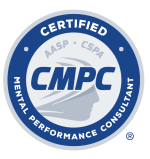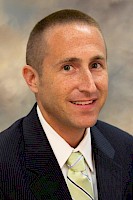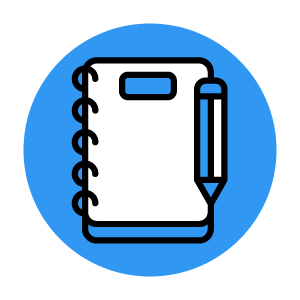Revised Mentored Experience Requirements & New CMPC Logo & Usage Guidelines
June 25, 2018
Dear CMPCs, CMPC candidates, and AASP members:
This update from the Certification Council includes:
- An explanation of the revised mentored experience requirement,
- The unveiling of the CMPC logo and Logo Usage Guidelines, and
- An introduction to new Council member Brandonn Harris.
Revised Mentored Experience Requirements (see pp. 10-12 in Candidate Handbook)
Based on feedback from CMPC mentors and graduate program directors, as well as research of best practices in professions similar to applied sport psychology, changes have been made in the revised mentored experience requirements for certification as a CMPC. In particular, these changes are based on the rationale that a developmental perspective is needed to vary the intensity of mentorship based on the mentee's credentials and years of experience.
a. Direct knowledge of services requirement
(p. 10). Ten hours of direct knowledge of services requirement replaces live/video session observation requirement to provide additional modalities for the mentor to observe the mentee's applied work with clients.
b. Novice and advanced mentee definitions
(p. 12). Two mentee levels have been defined to address developmental needs of mentees. The developmental level of the mentee is determined by the amount of direct client contact accumulated. Novice mentees have accumulated less than 200 hours of direct client contact, whereas advanced mentees have accumulated more than 200 hours of direct client contact.
c. Novice mentee direct knowledge of services requirements
(p. 10). Ten hours of audio recording, video recording, or live observation onsite or via distance video technology is required to satisfy the direct knowledge of services requirement. NOTE: THIS IS A CHANGE FROM THE PREVIOUS REQUIRED VIDEO OR LIVE OBSERVATION - AUDIO RECORDING IS NOW ACCEPTABLE.
d. Advanced mentee direct knowledge of services requirement
(p. 10). Ten hours of samples provided to the mentor using an acceptable combination of modalities (e.g., onsite observation, audio or video recording, live streaming, test and questionnaire protocols, client homework, and/or other client generated materials) is required to satisfy the director knowledge of services requirement. The particular modalities selected should be based on the mentor's consideration of the mentee's experience, education, and knowledge; purpose of mentorship on continuum from training to validation; legal requirements and ethical standards; specific work environment, and availability and appropriateness of specific technical equipment.
All other mentoring requirements remain the same for all CMPC candidates, such as the minimum of 400 total hours of mentored experience, minimum of 200 hours spent in direct client contact, maximum of 150 hours spent in support activities, and a minimum of 40 hours of face-to-face or electronic mentorship.
New CMPC Logo & Usage Guidelines
 The logo shown to the left was developed by the Council to recognize those certified as a CMPC. Notice that AASP is included inside the logo to honor the historical role of AASP in the certification program. The CMPC credential may only be used by individuals who have earned CMPC certification and whose certification is in good standing. Individuals cannot use the CMPC designation until they have been notified that they have successfully completed all eligibility requirements. Current CMPCs must fulfill all recertification requirements to maintain use of the credential and logo. All CMPCs should read these guidelines to appropriately use the CMPC credential and log in appropriate ways.
The logo shown to the left was developed by the Council to recognize those certified as a CMPC. Notice that AASP is included inside the logo to honor the historical role of AASP in the certification program. The CMPC credential may only be used by individuals who have earned CMPC certification and whose certification is in good standing. Individuals cannot use the CMPC designation until they have been notified that they have successfully completed all eligibility requirements. Current CMPCs must fulfill all recertification requirements to maintain use of the credential and logo. All CMPCs should read these guidelines to appropriately use the CMPC credential and log in appropriate ways.
The CMPC Logo & Usage Guidelines and logos that CMPCs can use to promote their certification in various professional materials can be accessed by logging into the Member Area of the website.
Brandonn Harris joins Certification Council
 The Certification Council is delighted to announce that Dr. Brandonn Harris from Georgia Southern University has joined the Certification Council as a Certificate member. Brandonn is an Associate Professor and Director of the Sport and Exercise Psychology graduate program in the School of Health and Kinesiology at Georgia Southern University. He has chaired the AASP Ethics Committee, coordinated the Youth Sport Special Interest Group, and has been a Certified Consultant and now CMPC with AASP since 2008. Brandonn chairs the Recertification Review Committee and also coordinates Continuing Education issues and interests for the Council.
The Certification Council is delighted to announce that Dr. Brandonn Harris from Georgia Southern University has joined the Certification Council as a Certificate member. Brandonn is an Associate Professor and Director of the Sport and Exercise Psychology graduate program in the School of Health and Kinesiology at Georgia Southern University. He has chaired the AASP Ethics Committee, coordinated the Youth Sport Special Interest Group, and has been a Certified Consultant and now CMPC with AASP since 2008. Brandonn chairs the Recertification Review Committee and also coordinates Continuing Education issues and interests for the Council.




